Latest Analysis and Commentary
by Khaled Abu Toameh • March 5, 2026 at 8:00 am
The Muslim Brotherhood is no less dangerous than the Iranian regime. While banned as a terrorist organization in some Arab countries, it maintains a presence in the Middle East and operates through networks and affiliates in Western countries through various organizations, think tanks and charities that promote its Islamist ideology. The Muslim Brotherhood cannot be eliminated through military action. Fighting this movement involves a multifaceted, long-term approach combining legal designations, financial restrictions, and ideological counter-messaging. Key strategies include designating affiliates as terrorist organizations, dismantling financial networks, and limiting their influence in education and religious institutions. The Muslim Brotherhood and Iran's regime share a deadly hatred of the West, advocate the destruction of Israel, and seek to undermine Arab and Islamic states that are moderate or pro-Western. Both have supported Hamas (the Palestinian branch of the Muslim Brotherhood) and aim to unify the Muslim world (ummah) under a shared political-religious vision. [Leading Muslim Brotherhood member Sayyid] Qutb saw Islam as a liberation movement requiring active struggle -- including violence -- to overthrow regimes that obstruct God's law.... and he advocated violent, offensive jihad. "Osama bin Laden also clearly identified with Qutb's Islamist ideology. As mentioned earlier, while a student at King Abdul Aziz University in Saudi Arabia, bin Laden was tutored by Qutb's brother, Muhammad... Militarily, the al-Qa'ida leadership has adopted Qutb's understanding of jihad and embraced his overall objective... By appropriating Qutb's interpretation of the justification for jihad, al-Qa'ida has been able to rationalise war against the United States." The US government recently designated certain chapters of the Muslim Brotherhood (specifically in Egypt, Jordan and Lebanon) as foreign terrorist organizations, following US President Donald J. Trump's November 2025 executive order to begin that process. Trump's order and the subsequent designation were good steps in the right direction, but they are hopelessly insufficient. The entire organization should be banned. There is no reason why the Trump administration should not follow the actions of Muslim countries such as Egypt, Saudi Arabia, the United Arab Emirates and Jordan, and officially designate the entire Muslim Brotherhood as a terrorist organization. It is meaningless to get rid of the Iranian regime while allowing the Muslim Brotherhood to continue serving as an inspiration to Islamist terrorists. The Muslim Brotherhood's reaction to the US-Israeli attack on the Iranian regime includes an appeal to Muslims to rise against the US and Israel. This call should be treated by the US and the rest of the West as a declaration of war by the Muslim Brotherhood. The Muslim Brotherhood seriously needs to be the next target after the mullahs of Iran.
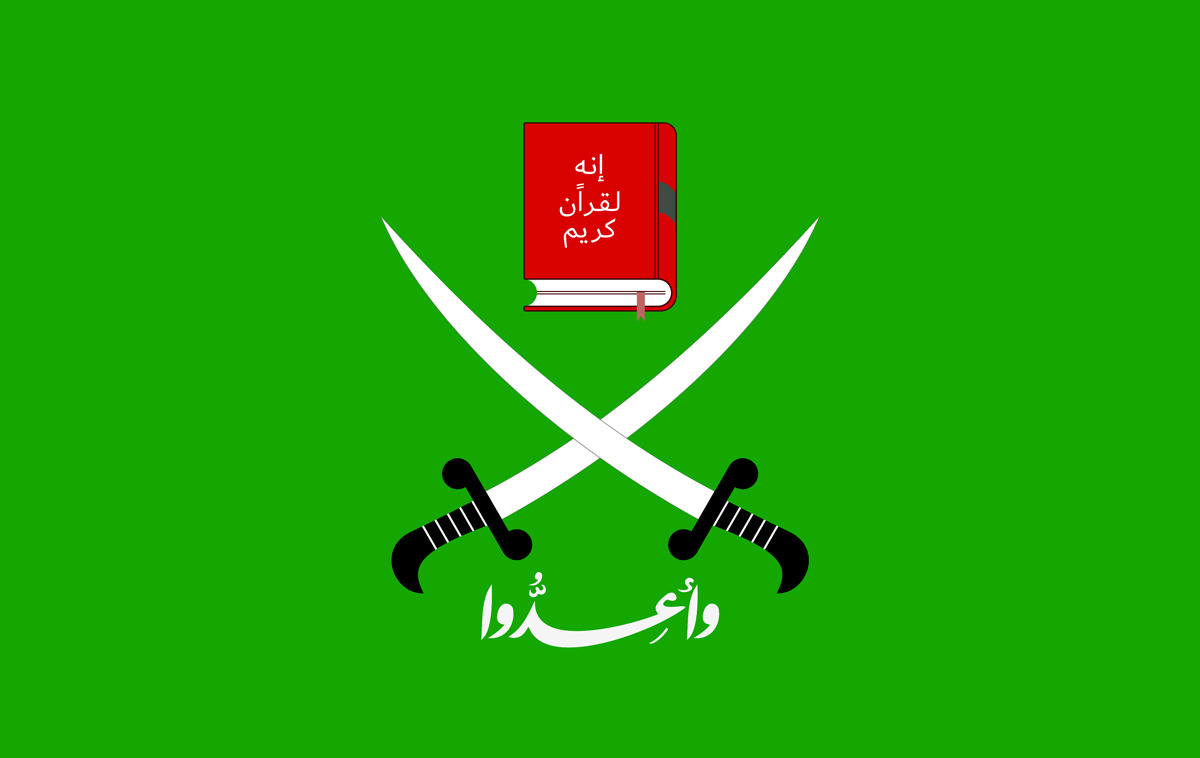
The Muslim Brotherhood is no less dangerous than the Iranian regime. The Muslim Brotherhood and Iran's regime share a deadly hatred of the West, advocate the destruction of Israel, and seek to undermine Arab and Islamic states that are moderate or pro-Western. Fighting this movement involves a multifaceted, long-term approach combining legal designations, financial restrictions, and ideological counter-messaging. Pictured: The logo of the Muslim Brotherhood.
The Muslim Brotherhood, a transnational Sunni Islamist organization aiming to institute sharia-based governance, has come out against the US-Israeli military operation targeting the Shiite Iranian regime, despite the Sunni-Shia divide that originated in 632 CE over who should succeed Islam's Prophet Mohammed. Sunnis, who make up 90% of Muslims, believed leaders should be elected by consensus, chose Abu Bakr as caliph. Shias believed leadership should follow Mohammed's bloodline, specifically via his cousin and son-in-law, Ali. In a statement published on March 1, Professor Mahmoud Hussein, acting "general guide" of the Muslim Brotherhood, wrote:
Continue Reading Article
by Lawrence A. Franklin • March 5, 2026 at 5:00 am
Israel's initiative in recognizing Somaliland potentially raises the level of threat from the Houthis, an Iranian-supported terrorist militia that occupies most of northern Yemen. Somaliland is located directly across from Yemen. The Houthis, also known as Ansar Allah ("Friends of Allah"), have proven their durability by having survived many US and Israeli airstrikes. If Somaliland allows Israel or the US to construct air and naval facilities on its Red Sea coast, the prevalence of terrorism throughout the Middle East -- including Houthi aggression against oil and gas shipping -- could enjoy a welcome revision. The November 2025 visit to Somaliland by US Africa Command head General Dagvin Anderson suggests that Washington is also fed up with Houthi terrorist operations. Possible future joint US-Somaliland military projects could include an upgrade to the Red Sea deep port of Berbera. Most of the outrage by international organizations and regional institutions consists of the typical virtue signaling. The opposition to the recognition of Somaliland by the African Union may reflect concern that Israel's initiative has set an impertinent international diplomatic precedent. By contrast, some pro-Western African states, such as Ethiopia and Kenya, could actually benefit from increased regional security. Ethiopia, a landlocked northeast African state, might explore the possibility of lobbying the government to construct a canal across Somaliland allow Ethiopia access to Red Sea shipping lanes. Currently, Ethiopia, like Israel itself, is surrounded by hostile Islamic countries. In Ethiopia's case, it is bounded by Eritrea and Somalia. By allying with Somaliland, Ethiopia would give its majority Christian people an opportunity to end their cultural isolation. Kenya's national sovereignty is also under threat by Islamic terrorist penetration of its national borders, and the country's pro-Western orientation is already highlighted by its participation in US-sponsored counterterrorist operations against Al Shabaab.
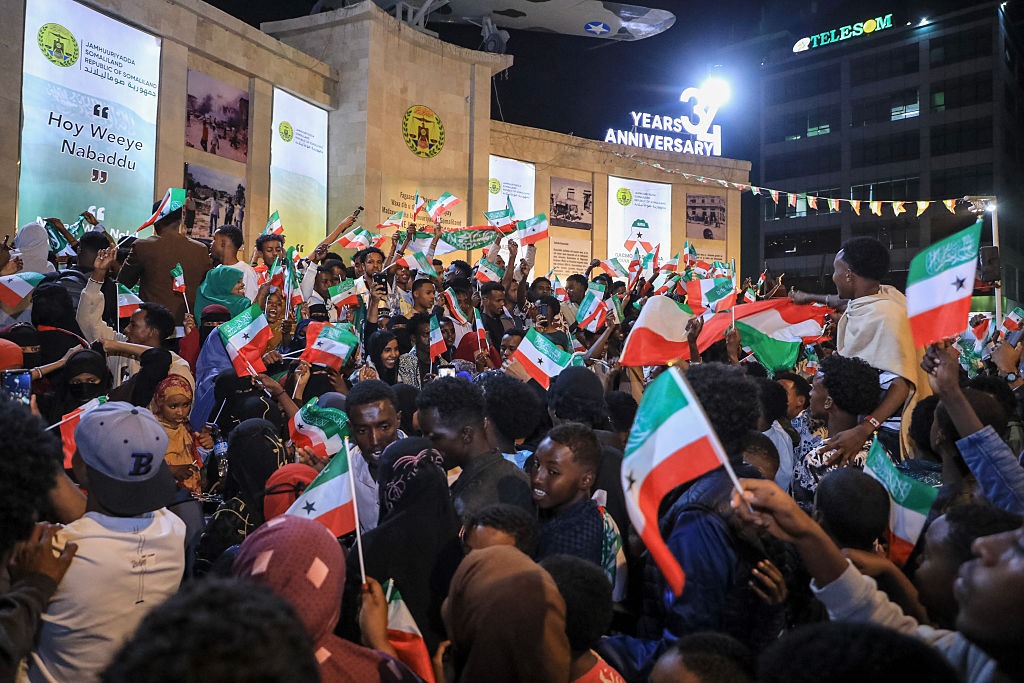
If Somaliland allows Israel or the US to construct air and naval facilities on its Red Sea coast, the prevalence of terrorism throughout the Middle East -- including Houthi aggression against oil and gas shipping -- could enjoy a welcome revision. Pictured: People gather to celebrate Israel's recognition of Somaliland's independence in downtown Hargeisa, on December 26, 2025. (Photo by Farhan Aleli / AFP via Getty Images)
Israel's December 2025 diplomatic recognition of Somaliland as an independent state may indicate significant improvements in Middle East security. Somaliland, which originally seceded from Somalia in 1991, had not been granted diplomatic status by any other member of the United Nations prior to Israel's recognition. Israel's initiative in recognizing Somaliland potentially raises the level of threat from the Houthis, an Iranian-supported terrorist militia that occupies most of northern Yemen. Somaliland is located directly across from Yemen. The Houthis, also known as Ansar Allah ("Friends of Allah"), have proven their durability by having survived many US and Israeli airstrikes. If Somaliland allows Israel or the US to construct air and naval facilities on its Red Sea coast, the prevalence of terrorism throughout the Middle East -- including Houthi aggression against oil and gas shipping -- could enjoy a welcome revision.
Continue Reading Article
by Robert Williams • March 4, 2026 at 1:30 pm
The video reveals something far more troubling: the survival of Iran's ideological and proxy doctrine inside elements aligned with Sudan's armed forces. Sudan's war, unfortunately, is no longer simply a domestic struggle for power. The war instead has increasingly been intersecting with a broader geopolitical contest stretching from the Persian Gulf to the Red Sea. The speech captured in the video echoes themes familiar across Iran's regional network: hostility toward Israel, denunciations of the United States and appeals framed in Islamist ideological terms. These narratives are central to what Iran calls the "Axis of Resistance" — a loose network of movements and militias aligned with Tehran's geopolitical ambitions. Tehran's most enduring weapon has never been its army. It has been its doctrine. Sudan's civil war may now be giving that doctrine a dangerous new battlefield.

The video reveals something far more troubling: the survival of Iran's ideological and proxy doctrine inside elements aligned with Sudan's armed forces.
An exclusive video circulating among intelligence sources shows a Sudanese army officer addressing a crowd during the country's ongoing civil war. In the speech, he openly threatens Israel and expresses solidarity with Iran against the United States and its allies. At first glance, such rhetoric might appear to be the product of wartime propaganda. It is not. The video reveals something far more troubling: the survival of Iran's ideological and proxy doctrine inside elements aligned with Sudan's armed forces. Even as Iran faces economic strain and growing regional pressure, the strategic model it developed over decades — cultivating ideological allies and proxy networks — continues to spread. Sudan's civil war may now be providing fertile ground for its revival. A Civil War Becoming a Geopolitical Arena
Continue Reading Article
by Salah Uddin Shoaib Choudhury • March 4, 2026 at 5:00 am
While Jamaat has often participated in electoral politics, its long-term objective has remained unchanged: the establishment of a theocratic state under Islamic jurisprudence. Within hours of the news [of Iranian Supreme Guide Ayatollah Ali Khameni's elimination].... Jamaat-e-Islami...[s]enior leaders delivered speeches accusing the United States and Israel of "murder" and calling for mass mobilization. Even though organizationally separate, the Muslim Brotherhood and Jamaat have maintained ideological synergy and periodic cooperation across South Asia and the Middle East. Both movements frame global politics as a civilizational struggle between Islamic governance and Western liberalism The party's reaction to Khamenei's death therefore aligns with a broader Brotherhood pattern: portraying Islamist leaders as martyrs, condemning Western military intervention, and mobilizing street sentiment against perceived external aggression. In Pakistan, Jamaat-e-Islami Pakistan issued statements condemning the US and praising Khamenei. Pakistani Prime Minister Shehbaz Sharif publicly expressed condolences, referring to Khamenei as a "martyr," signaling Islamabad's diplomatic tilt toward Tehran.... In India, Jamaat-e-Islami Hind characterized the US-Israeli strikes as aggression and described Khamenei in reverential terms. China's engagement with Islamist political actors is not ideological but strategic... that Jamaat's anti-American rhetoric may not merely be reactive but part of a broader geopolitical appraisal. Historically, some Western policymakers have viewed Islamist parties as "moderate" alternatives to more violent jihadist factions. However, the Brotherhood's track record across the Middle East -- from Egypt to Gaza -- illustrates that participation in elections does not necessarily equate to ideological moderation. Jamaat's present mobilization over Khamenei underscores that its core worldview remains rooted in a civilizational narrative that positions the United States as an adversary. Even media outlets such as Al Jazeera have continued narratives sympathetic to Iran. By framing Khamenei's death as martyrdom and Western aggression, they reinforce their narrative of global Islamic victimhood. The danger lies not only in street protests but in gradual ideological conditioning. By presenting Iran's theocratic regime as a victim of Western aggression, Jamaat implicitly legitimizes clerical rule and the fusion of religion and state power. The protests over Khamenei's elimination are not merely about Iran. They are about ideology. For policymakers in Washington, Brussels, and New Delhi, the lesson should be clear: political Islam movements cannot be evaluated solely through electoral participation, diplomatic engagement or even promises of prosperity. Their doctrinal commitments matter. The events unfolding in Bangladesh demonstrate that beneath tactical flexibility lies an enduring ideological project -- one that continues to view global politics through the lens of religious sovereignty and civilizational struggle for global control.
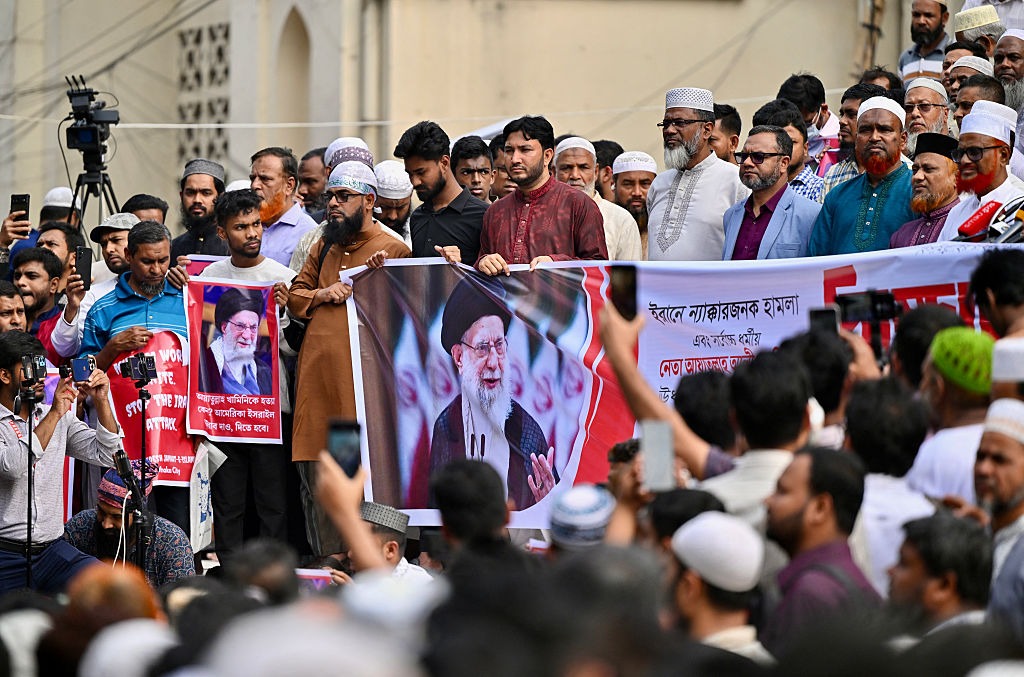
Pictured: Activists of the Jamaat-e-Islami party hold posters of Iran's late Supreme Leader Ayatollah Ali Khamenei during a protest against the US and Israel in Dhaka, Bangladesh on March 1, 2026. (Photo by Munir Uz Zaman/AFP via Getty Images)
The elimination of Iran's Supreme Leader, Ali Khamenei, in a joint US-Israeli military operation has triggered a predictable wave of outrage against the West across hardline Islamist networks. In Bangladesh, however, the reaction has revealed something deeper and more consequential: the enduring ideological character of Jamaat-e-Islami, not yet designated as a Foreign Terrorist Organization by the United States, and its strategic alignment with transnational Islamist movements such as the Muslim Brotherhood.
Continue Reading Article
by Lawrence Kadish • March 3, 2026 at 5:00 am

Pictured: The USS Gerald R. Ford aircraft carrier, on November 13, 2025. (Photo by Paige Brown/US Navy via Getty Images)
For President Donald J. Trump, it doesn't take another 9/11 attack on the United States to strike at the head of a snake. His preemptive assault on the world's leading state sponsor of terrorism, Iran, recognizes the stark reality that the ruling ayatollahs and their Islamic Revolutionary Guard Corps have not only sworn to destroy the State of Israel but seek to dominate the entire Middle East, from Yemen to Syria and beyond. They have slaughtered their own citizens, murdered American military personnel, and encouraged and funded acts of terror worldwide. Despite Trump's efforts to engage in diplomacy, it was clear from the start that the terrorists of Tehran were never going to accede to peace. They would not have stopped until their nuclear-tipped ballistic missiles had left a smoking mushroom cloud over Tel Aviv, and Riyadh would probably have been not far behind.
Continue Reading Article
by Ahmed Charai • March 3, 2026 at 4:00 am
Governments confident in their legitimacy do not rely systematically on lethal repression to preserve authority. Iran's long-term stability — should responsible leadership emerge — will depend not on ideological rigidity, but on whether political structures align with the aspirations and capabilities of its people. Any future framework must be conditional, sequenced, and compliance-based. Economic reintegration would need to be phased and benchmark-driven. Whether or not any single individual ultimately leads that transformation, the emergence of structured, modernization-oriented leadership is essential if Iran is to move from confrontation to responsible statehood. What follows will not be determined by rhetoric but by decisions — in Tehran, by the Iranian people; in Washington; and across the region. This is not merely a period of tension; it is a structural test of governance, credibility, and strategic direction. The objective is the restoration of balance, sovereignty, and lawful order.
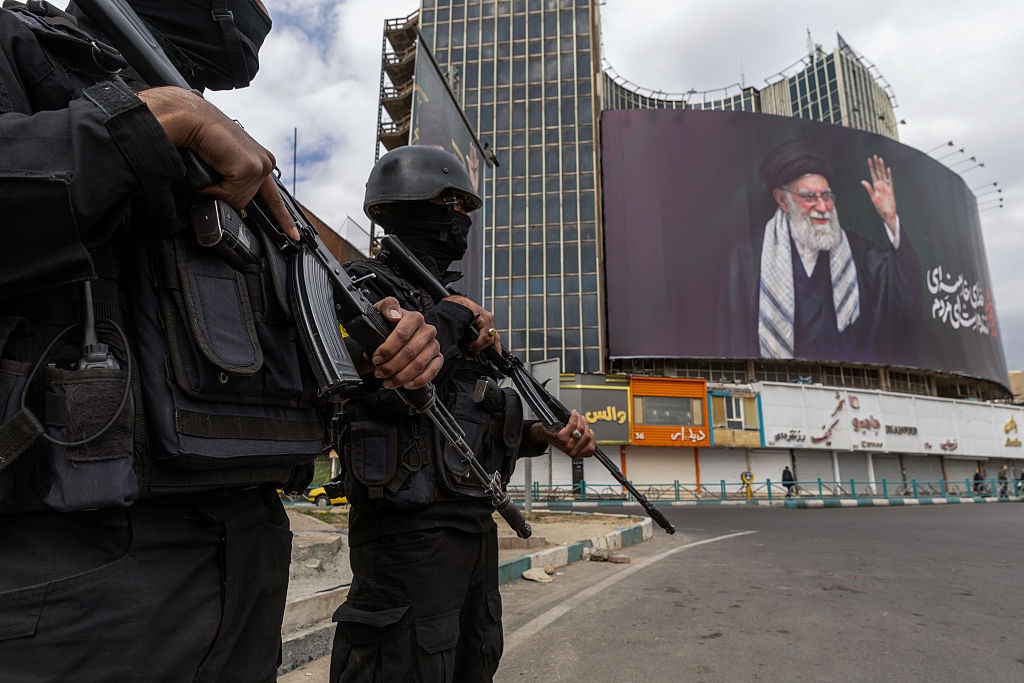
Governments confident in their legitimacy do not rely systematically on lethal repression to preserve authority. Iran's long-term stability — should responsible leadership emerge — will depend not on ideological rigidity, but on whether political structures align with the aspirations and capabilities of its people. Pictured: Members of Iran's security forces on a street in Tehran on March 2, 2026. (Photo by Majid Saeedi/Getty Images)
For many years, I have argued that a political system built on internal repression and external confrontation cannot sustain durable legitimacy or long-term strategic credibility. A state that governs through fear at home while exporting instability abroad ultimately confronts the accumulated costs of that contradiction. No system can indefinitely suppress its society while destabilizing its region without eroding its own foundations. For more than four decades, the Islamic Republic of Iran has relied on a dual doctrine: coercion internally and confrontation externally. Domestically, repression has been institutionalized — imprisonment of journalists, systematic discrimination against women, suppression of civil protests, and repeated lethal crackdowns. Externally, the regime projected power through proxy militias, ideological expansion, and calibrated destabilization, even as its own economy deteriorated under sanctions, corruption, and structural mismanagement.
Continue Reading Article
by Khaled Abu Toameh • March 2, 2026 at 5:00 am
These Palestinian statements should be viewed as a direct threat not only against Israel, but also against the US. Unfortunately, the Palestinians have not learned from the self-defeating decisions they made in the past, when they chose to align themselves with the enemies of Israel and the US. Removing Iran's mullahs from power is not enough. The Israeli-US military operation should be expanded to include the Iranian regime's proxies.

Palestinian statements of support for the Iranian regime should be viewed as a direct threat not only against Israel, but also against the US. Pictured: Iran's late Supreme Leader Ayatollah Ali Khamenei (R) meets with the late Ismail Haniyeh (C), head of the political bureau of Hamas, and Ziyad al-Nakhalah, Secretary General of Palestinian Islamic Jihad, on July 30, 2024. (Photo by the Iranian Supreme Leader's Press Office via Getty Images)
Shortly after airstrikes on Iran began on February 28, several Palestinian groups, including Hamas and Palestinian Islamic Jihad (PIJ), issued strong condemnations of Israel and the US and voiced support for the Iranian regime. They also called on Arabs and Muslims to stand united against Israel and the US. Palestinian support for the Iranian regime did not come as a surprise. For decades, the Iranian regime had provided significant financial and military support to both Hamas and PIJ. This backing is a cornerstone of Iran's "Axis of Resistance" strategy, which aims to project regional influence to counter Israeli and US interests in the Middle East. In the past, the Palestinians supported Iraqi dictator Saddam Hussein's 1990 invasion of Kuwait.
Continue Reading Article
by Nils A. Haug • March 1, 2026 at 5:00 am
How fitting that the US and Israel finally retaliated against 47 years of aggression by the regime of the Islamic Republic of Iran during the week of the Biblical Purim festival. The greatness of Western civilization was primarily founded on a composite of Judeo-Christian religious values, Greek philosophy and political theory, and Roman jurisprudence, all providing definitive moral guidance. This is the noble civilization that, through its principles, has led much of the world into prosperity, democracy, individual liberty, equal justice under the law, freedom of expression and human rights. Ironically, free speech is under self-imposed threat of termination in their nations, including those located as far from Europe as Australia. When Rubio delivered his inclusionary speech, which received a standing ovation, the following day, the European Parliament, and associated personages, appeared already to have made up their minds. They were happy with the current state of affairs, thank you, and did not need America's cultural, political or scientific input; only its guarantee for defense or support for ideological dreamscapes. Their message was obvious: they would not commit to the US's idea of a common Western cultural heritage, nor would they join the US in preventing civilizational decline. Those brave souls who do have the courage to speak up are ostracized, imprisoned or overruled. Apart from ruinous civil wars to remedy the situation, the last hope seems to reside in a few dedicated personalities, mainly in the US -- that last bastion of free speech -- who occasionally appear to view the status quo as in need of a bit of a shake-up. These individuals evidently believe that the values of the West are worth preserving. Elsewhere, Western civilization endures in a few lonely places, such as Hungary and Poland, as well as the tiny nation of Israel – a courageous country that has spent nearly eight decades fighting – and winning – wars of self-defense, yet continues to be unjustly vilified by almost everyone. These are just some of the brave nations that exemplify, however imperfectly, the reservoir of Judeo-Christian values, the fount of the West. Might anyone else please sign up? Europe's decision-makers, meanwhile, blissfully carry on, condemning Israel, rebuffing the US, and voting to send their countries into barbarism.

Only a few brave nations exemplify, however imperfectly, the reservoir of Judeo-Christian values, the fount of the West. Might anyone else please sign up? Pictured: A Roman statue of Atlas (circa 2nd-century CE) at the National Archaeological Museum of Naples. (Photo by Lalupa/Wikimedia Commons)
How fitting that the US and Israel finally retaliated against 47 years of aggression by the regime of the Islamic Republic of Iran during the week of the Biblical Purim Festival. Then, roughly 2,300 years ago, Haman, viceroy to Persia's King Ahasuerus, threw a lot ("pur", plural "purim") to determine the date by which he would kill all the Jews in the empire. This plan's successor sits (or sat) in Tehran's Palestine Square: a "doomsday clock" counting down the minutes until Israel is supposed no longer to exist: 2040, to be exact. Iran's current regime began its bellicosity in November 1979 with Ayatollah Ruhollah Khomeini's vows of "Death to America," then kidnapping and holding hostage 53 US Embassy personnel in Tehran for 444 days, until the inauguration of US President Ronald Reagan in 1981 appears to have frightened them off. The hostages were immediately released.
Continue Reading Article
by Amir Taheri • March 1, 2026 at 4:00 am
[A] war is never won by one side declaring victory but when one side admits defeat. A short, sharp and necessarily limited attack will be followed by Tehran accepting a ceasefire and expressing willingness to enter a new round of negotiations, exactly like what happened last June. In that case the attack would have been pointless because Tehran has already used the negotiation charade that has continued for almost half a century. The second scenario is that the "hardline faction" is defanged and pro-US groups seize control. That would mean returning to the good old days of President Barack Obama when John Kerry and Mohammad Javad Zarif strolled together along Lake Leman to ponder how to hoodwink critics at home. The third scenario is that the attack causes systemic collapse and enables Reza Pahlavi's "team" to concoct a transitional government and organize their referendum. [A]re [you] ready for the long haul that could produce a positive outcome as it did in West Germany, Japan and South Korea after World War II and the peninsular war.

(Image source: iStock/Getty Images)
Then what? This is the question that theoreticians of war from Sun Tzu to Jomini and Liddell-Hart and passing by Clausewitz advise leaders to ask before they order the firing of the first shot in a war. Thus, one may suggest that US President Donald Trump should also ask that question before, as many expect, he triggers a new round of military attacks on Iran. The New York Times believes that by assembling the largest strike force since 2003 Trump has cornered himself in a position from which he cannot wiggle out without losing face or more. Former State Department "strategic brain" Richard Haass claims that Trump is sleep-walking into a war. In Tehran, officials also predict some form of military action which they expect would clear the air without threatening the existence of the regime.
Continue Reading Article
by Majid Rafizadeh • February 28, 2026 at 5:00 am
In an unsurprising reversal of its own stated principles, the United Nations elevated the Islamic Republic of Iran, the serial human-rights-abusing regime, by appointing it vice-chair to a body charged with overseeing the UN Charter. The European Union failed to block the appointment, despite having previously acted to prevent Russia from holding certain international positions after it invaded Ukraine. European governments possess diplomatic leverage and experience in stopping controversial candidates, yet in this instance they chose silence. The message this appointment sends to the Iranian people and other victims of repressive and exploitative tyrannies, is that the mass murder, torture and blinding of dissidents are secondary to diplomatic etiquette. The result is that rulers of Iran, which has long been the leading state sponsor of terrorism, are now in a position connected to overseeing the principles meant to restrain state violence and uphold international law. The UN's abuses of moral decency and taxpayer-funds have to be stopped – or at least financially curtailed into the irrelevance the UN so painstakingly earned. Authoritarian governments often value symbolic recognition as much as material power: it signals to their populations that resistance is futile and that the world accepts their rule. In the end, this episode raises profound questions about the ongoing viability of the UN and other questionable international institutions.... The organization founded to protect humanity has irrevocably detached itself from the very people it was meant to serve. It is time to withdraw further support from the United Nations and many other unaccountable and untransparent unelected institutions. They had the power to stop these grotesque masquerades but chose not to act.

In an unsurprising reversal of its own stated principles, the United Nations elevated the Islamic Republic of Iran, the serial human-rights-abusing regime, by appointing it vice-chair to a body charged with overseeing the UN Charter. This episode raises profound questions about the ongoing viability of the UN and other questionable international institutions. Pictured: Iran's Ambassador and Deputy Permanent Representative to the UN Gholamhossein Darzi listens during a UN Security Council meeting at UN headquarters in New York on January 15, 2026. (Photo by Angela Weiss/AFP via Getty Images)
After the Iranian regime's recent brutal crackdown on protesters — marked by mass murders, mass arrests, torture, and sweeping internet shutdowns designed to hide the scale of the violence — one might reasonably have expected the international community that piously lectures everyone about human rights and protecting civilians to erupt in outrage and mobilize immediately. Instead, in an unsurprising reversal of its own stated principles, the United Nations elevated the Islamic Republic of Iran, the serial human-rights-abusing regime, by appointing it vice-chair to a body charged with overseeing the UN Charter. UN Watch recently wrote: "NO JOKE: The Islamic regime in Iran has just been elected as Vice-Chair of the U.N. Commission for Social Development, whose priority theme will be promoting democracy, gender equality, and ensuring tolerance and non-violence."
Continue Reading Article
by Guy Millière • February 27, 2026 at 7:00 am
In January, UN High Commissioner for Human Rights Volker Türk spoke of the "unspeakable atrocities" suffered by millions of Jews, but added that the atrocities had also been suffered by "members of other minorities." Not quite. Although other minorities were indeed persecuted by the Nazis, none of them faced attempted extermination. Speaking in this way trivializes the Holocaust and makes it comparable to other crimes. UN Secretary-General António Guterres not only also trivialized the Holocaust; he tried to claim that the United Nations fights antisemitism. If only! The Jerusalem Center for Security and Foreign Affairs wrote in 2005 that the UN "has become the leading global purveyor of anti-Semitism." Italian legal scholar Francesca Albanese, the UN's "Special Rapporteur on the Occupied Palestinian Territories" (her title already indicates a stance hostile to Israel), has made countless antisemitic remarks. Nevertheless, in 2025, she was kept in her position for an additional three years. Despite a budget crisis at the UN, roughly $100 million a year is allocated just to target Israel, along with a UN commission of inquiry that "promotes genocide against Jews." Historically, a "Palestinian people" – as opposed to various Arabs who happened to be living in the area at the time along with various Jews, Christians, Europeans and others -- was totally fabricated. There is simply no trace of a "Palestinian people" or a "national liberation struggle" before 1964. In the Qur'an, Israel and Israelites are mentioned 43 times, Palestine and Palestinians zero. Moreover, the Qur'an itself states that the Land of Israel belongs to the Children of Israel: "And remember when Moses said to his people, 'O my people! Remember Allah's favors upon you when He raised prophets from among you, made you sovereign, and gave you what He had never given anyone in the world. O my people! Enter the Holy Land which Allah has destined for you ˹to enter˺. And do not turn back or else you will become losers." — Quran 5:20–21 (Al-Mā'idah) "And We said to the Children of Israel: 'Dwell securely in the land.'" — Quran 17:104 (Al-Isrā') "The Palestinian people does not exist. The creation of a Palestinian state is only a means for continuing our struggle against the state of Israel for our Arab unity. In reality, today there is no difference between Jordanians, Palestinians, Syrians and Lebanese. Only for political and tactical reasons do we speak today about the existence of a Palestinian people, since Arab national interests demand that we posit the existence of a distinct Palestinian people to oppose Zionism." — Zuheir Mohsen, a member of the PLO Executive Committee, in 1977. "For tactical reasons, Jordan, which is a sovereign state with defined borders, cannot raise claims to Haifa and Jaffa, while as a Palestinian, I can undoubtedly demand Haifa, Jaffa, Beer-Sheva and Jerusalem. However, the moment we reclaim our right to all of Palestine, we will not wait even a minute to unite Palestine and Jordan." — Zuheir Mohsen, 1977. Palestinian terrorism became treated as acceptable terrorism. The need to create a Palestinian state to get the better of those overly successful, upstart Jews emerged as an imperative. Consequently, it also became possible to say that the Holocaust was just one crime among others; that Jews, too, could commit atrocious crimes. For the Europeans, this manufactured overhaul of the facts may have come as a relief: they could now tell themselves that if the Jews were as bad as the Nazis, then murdering Jews was perhaps not such a terrible undertaking. Palestinian terrorism became treated as acceptable terrorism. The need to create a Palestinian state to get the better of those successful, upstart Jews emerged as an imperative. Particularly unacceptable to many people is the Israelis refusing to sit back and let themselves be wiped out. All the same, the Israelis would warn Gazans to evacuate in advance of impending military strikes, with large numbers of leaflets, text messages and phone calls in Arabic, and the IDF even organized mass evacuations to safe zones. If Palestinians tried to leave, their own leaders would shoot them. The international community called these Israeli efforts to save Palestinian lives a "genocide." "If Israel is attempting genocide, they are really, really bad at it." — US Ambassador to Israel Mike Huckabee. That Israel was fighting for its survival against a terrorist organization that itself has explicitly genocidal aims was painstakingly ignored. By preserving the memory of slavery in Egypt at the time of the pharaohs nearly 4,000 years ago, the memory of the Holocaust, and the many persecutions in between, Israeli Jews maintain their determination not just to fight and survive, but to excel. For Westerners, Jew-hate, sadly, is just a distraction, a means of denial to keep them from seeing the real threat to their existence: the hijrah, Muslim migration to the West to make it Islamic.
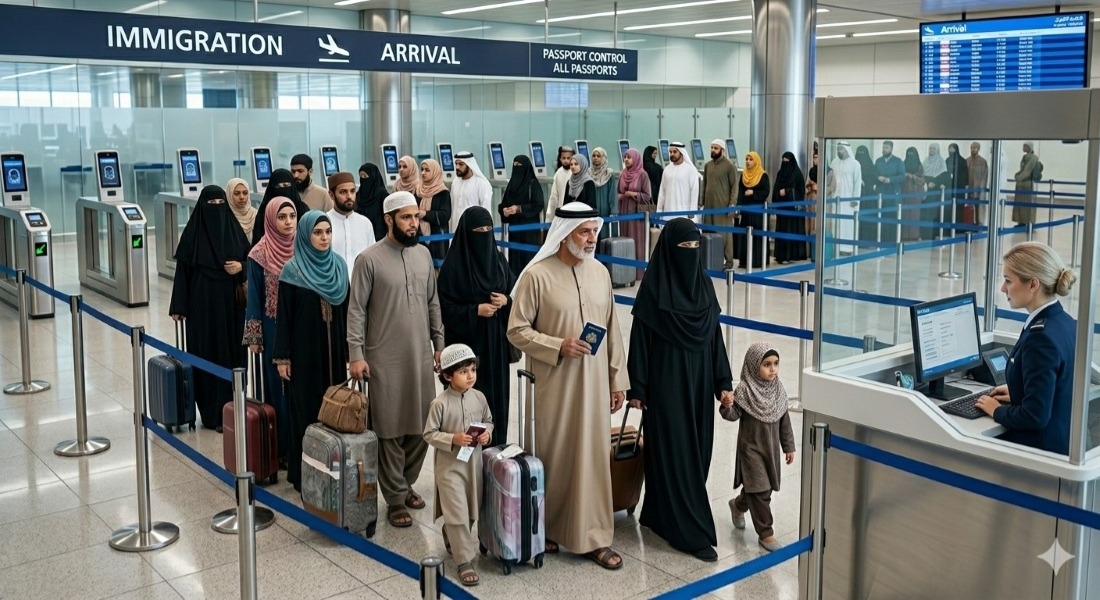
For Westerners, Jew-hate, sadly, is just a distraction, a means of denial to keep them from seeing the real threat to their existence: the hijrah, Muslim migration to the West to make it Islamic. (AI image generated by Google Gemini)
General Dwight D. Eisenhower, when he liberated Europe's concentration camps, insisted that journalists and photographers document the atrocities immediately, or, he predicted, the world would soon say they had never actually happened. In a few years from now, the last survivors of the Holocaust will have disappeared, and the memory of what happened will fade even further. The Holocaust was infinitely more than an attack on "dignity and human rights." It was a unique crime: the attempt at the total extermination of an entire people by industrial means in supposedly civilized countries of the West.
Continue Reading Article
by Khaled Abu Toameh • February 26, 2026 at 5:00 am
Recently, there have been attempts to give Mahmoud Abbas's Palestinian Authority (PA) a role in post-war management of the Gaza Strip -- along with Qatar, Turkey and Pakistan, all Islamists and long-term adversaries of Israel. Earlier this week, the office of UN Special Coordinator for Gaza Nikolay Mladenov, who was appointed by the US as the Director-General of Trump's "Board of Peace," revealed the establishment of a "Liaison Office" for the PA. Mladenov seems to believe that the PA can play a positive role in the Gaza Strip, even though polls published by the Palestinian Center for Policy and Survey Research have consistently shown that more than 80% of Palestinians believe it is corrupt. Unsurprisingly, Palestinian officials were quick to welcome Mladenov's announcement: it whitewashes the PA and makes it appear as a legitimate and credible party in post-war Gaza arrangements. Meanwhile, a senior Palestinian official closely associated with PA President Mahmoud Abbas, Azzam al-Ahmad, also Secretary-General of the Executive Committee of the Palestine Liberation Organization (PLO), told the Egyptian newspaper Al-Shorouq, in an interview published on February 23, that "Hamas is not a terrorist organization and we reject its disarmament." Al-Ahmad also rejected [other] demands by the Trump administration.... The statements by al-Ahmad are proof that the PA leadership continues to talk in two voices: one in Arabic intended for Arab audiences and the second in English directed at Westerners. Based on public opinion polls conducted in late 2025, a large majority of Palestinians share al-Ahmad's opposition to the disarmament of Hamas. Just because many Palestinians might be enraged at Hamas does not mean they are ready to live peacefully side-by-side with Israel. What we are currently witnessing is an attempt to bring the PA back into the Gaza Strip through the back door. If the PA does not consider Hamas a terror organization and wants it to keep its weapons, what exactly is it going to do in the Gaza Strip? Pay salaries to Hamas and its employees? Or perhaps serve as a channel for transferring billions of dollars in aid to Hamas? In light of al-Ahmad's statements, it is clear that the PA's return to the Gaza Strip would only help Hamas and other terror groups maintain their political and security control of the territory. Al-Ahmad is currently trying to convince Hamas, Palestinian Islamic Jihad and other terror groups to join the PLO. According to reports, that is why he recently met in Egypt with representatives of the terror groups. The PA wants to return to the Gaza Strip not to replace Hamas, but to join forces with it.
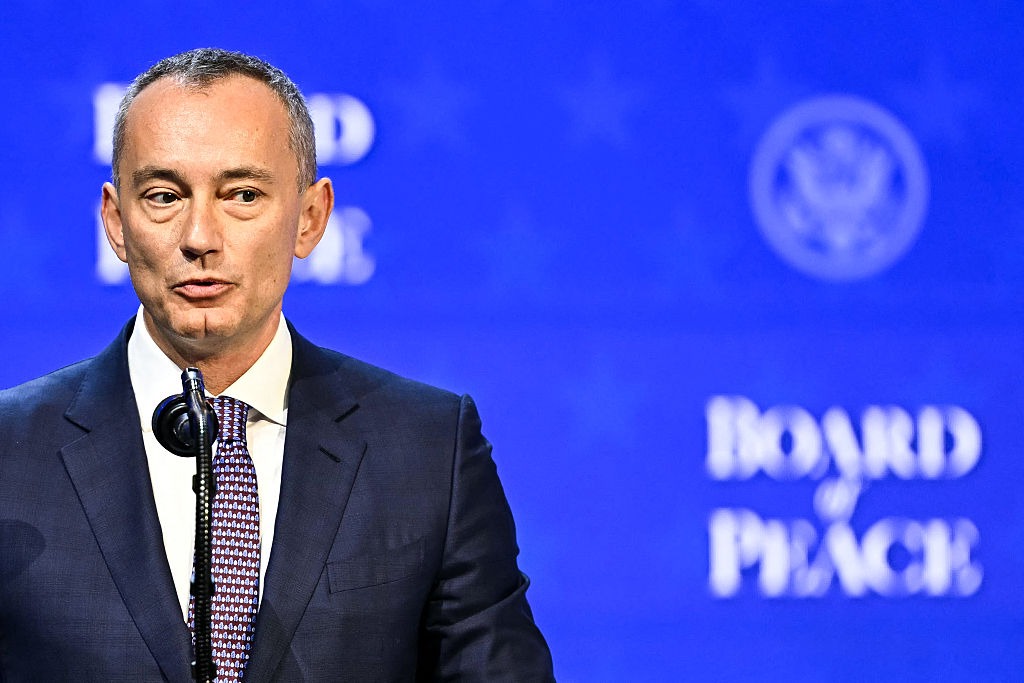
Earlier this week, the office of UN Special Coordinator for Gaza Nikolay Mladenov, who was appointed by the US as the Director-General of Trump's "Board of Peace," revealed the establishment of a "Liaison Office" for the PA. Pictured: Mladenov speaks at the "Board of Peace" meeting in Davos, Switzerland on January 22, 2026. (Photo by Fabrice Coffrini/AFP via Getty Images)
Recently, there have been attempts to give Mahmoud Abbas's Palestinian Authority (PA) a role in post-war management of the Gaza Strip -- along with Qatar, Turkey and Pakistan, all Islamists and long-term adversaries of Israel. Earlier this week, the office of UN Special Coordinator for Gaza Nikolay Mladenov, who was appointed by the US as the Director-General of Trump's "Board of Peace," revealed the establishment of a "Liaison Office" for the PA. Mladenov seems to believe that the PA can play a positive role in the Gaza Strip, even though polls published by the Palestinian Center for Policy and Survey Research have consistently shown that more than 80% of Palestinians believe it is corrupt. According to Mladenov's office:
Continue Reading Article
by Drieu Godefridi • February 25, 2026 at 5:00 am
Deprived of Marxism, the Spanish left has sought refuge in a disparate ideological mosaic: radical environmentalism, complicit indulgence toward political Islam, the dismantling of borders, unconditional support for the Palestinians against Israel – all stacked together into an improbable and incoherent magma. The Sánchez government has another reason for aligning with jihadists: the corruption scandals that have engulfed even the prime minister's immediate family. The high point of the Spanish left's radicalization was reached with a January 2026 decree legalizing between 500,000 and a million illegal immigrants. Although presented as a humanitarian and economic measure, this slap-happy decision provoked widespread outrage among Spaniards. Traumatized by its history, cornered by the judiciary, and deprived of ideological reference points, the Spanish left appears to be locking itself into radical dogmas and adopting increasingly divisive policies simply to remain in power.
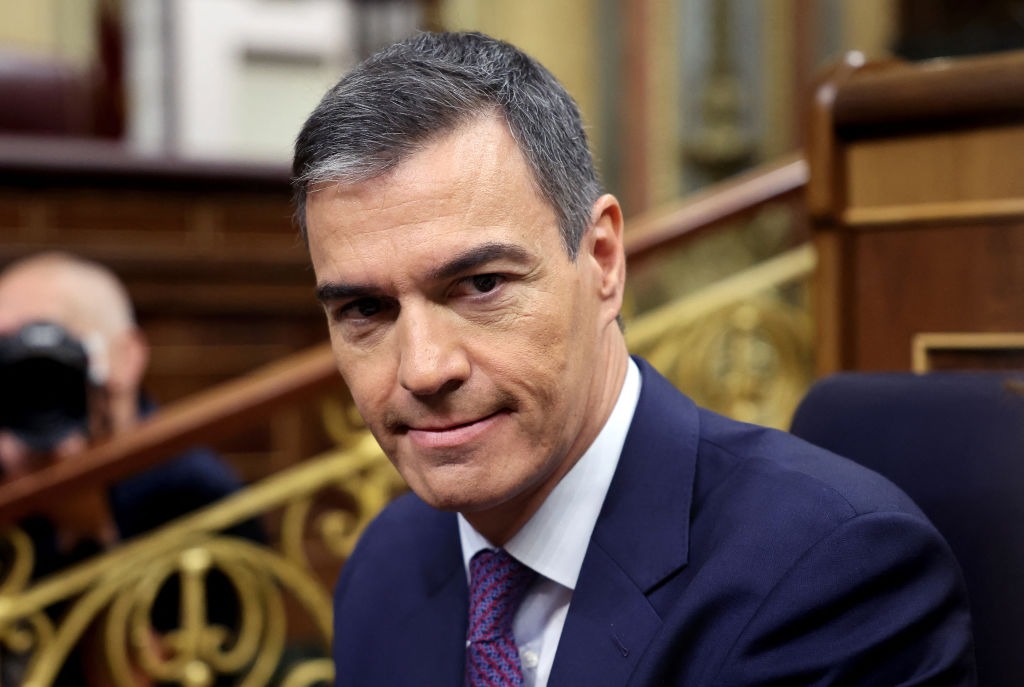
Deprived of Marxism, the Spanish left has sought refuge in a disparate ideological mosaic: radical environmentalism, complicit indulgence toward political Islam, the dismantling of borders, unconditional support for the Palestinians against Israel – all stacked together into an improbable and incoherent magma. The government of Prime Minister Pedro Sánchez (pictured) has another reason for aligning with jihadists: the corruption scandals that have engulfed even the prime minister's immediate family. (Photo by Thomas Coex/AFP via Getty Images)
Between corruption and radicalization, Spain's government seems to be spinning out of control. In 1936, Spain plunged into civil war. A proud nation collapsed into violence, fire, and devastation. The Spanish Civil War, which set a communist-dominated Republican left against an authoritarian nationalist right, claimed roughly half a million lives. Priests were dragged through the streets, beaten, and mutilated — ears, noses, even genitals cut off — before being shot or having their throats slit. Nuns were raped prior to execution, in cases documented across several regions. Churches were set ablaze with priests still inside. In many towns, militiamen forced clergy to drink motor oil or gasoline before burning them alive. Spain's right wing, not to be outdone, killed just as many.
Continue Reading Article
by Lawrence Kadish • February 25, 2026 at 4:00 am
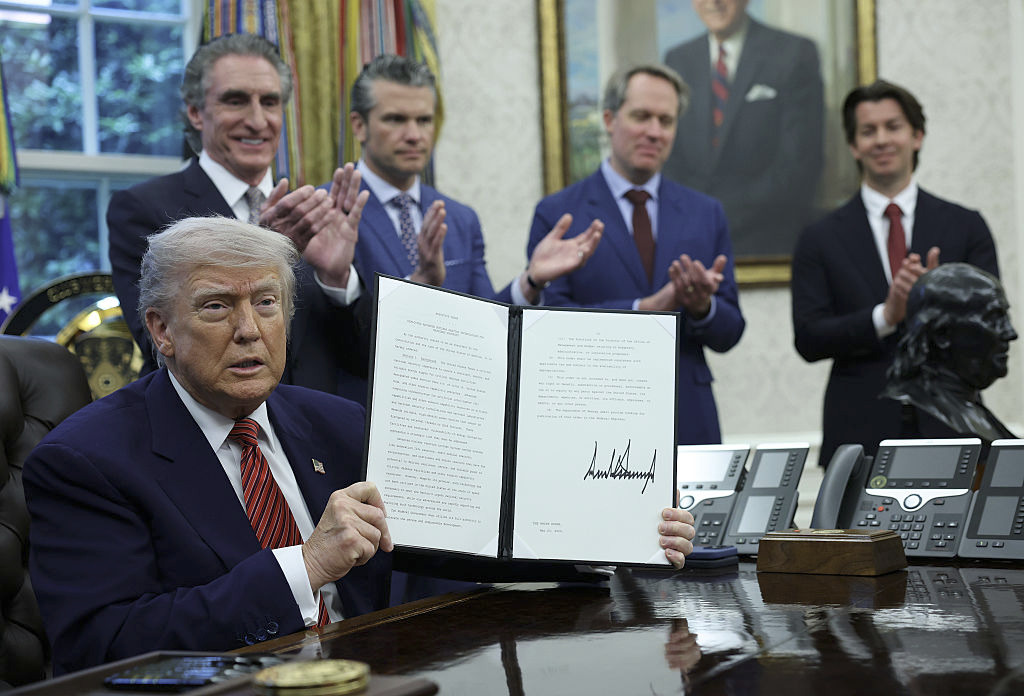
President Donald Trump has assumed a quiet but strategic leadership role in advancing our country's pursuit of fusion energy -- the same process that powers the sun and one that could literally provide America with unlimited energy far into the future. Pictured: Trump holds up an executive order on the rapid development, deployment and use of advanced nuclear technologies, on May 23, 2025, in the White House. (Photo by Win McNamee/Getty Images)
Perhaps not since Teddy Roosevelt have we had a president who thinks as big as Donald J. Trump. From his projection of military power that protects our national interests to his understanding of how a complex economy powers the greatest nation on earth, President Trump has demonstrated a unique appreciation of what America must do to maintain its global leadership. It is for that reason that he has assumed a quiet but strategic leadership role in advancing our country's pursuit of fusion energy -- the same process that powers the sun and one that could literally provide America with unlimited energy far into the future.
Continue Reading Article
by Gordon G. Chang • February 24, 2026 at 5:00 am
A Declaration of Arrest Report, issued by the Las Vegas Metropolitan Police Department in connection with the detention of Ori Solomon on January 31, states that there is a "deeper conspiracy" between an illegal biological lab in Reedley, California and a residence containing apparently dangerous substances in Nevada. Fortunately, in California, Code Enforcement Officer Jesalyn Harper in December 2022 noticed a garden hose connected to a supposedly abandoned building. She entered the structure and discovered what appears to have been a secret biological weapons laboratory. Inside, Harper found Chinese nationals working in white coats. The lab stored nearly a thousand transgenic mice—773 live and more than 175 dead— "genetically engineered to catch and carry the COVID-19 virus." Authorities also found medical waste and chemical, viral, and biological agents. There were on-site at least 20 potentially infectious pathogens, including those causing coronavirus, HIV, hepatitis, and herpes. Moreover, the Chinese regime is behind that conspiracy. All this demonstrates that China's Communist Party, which could have ordered Zhu and Wang to shut down the effort after the discovery of the Reedley lab, allowed it to continue. Among other things, the continuation of the effort suggests there is a broader effort to spread disease in the United States. "It is indeed brutal to kill one or two hundred million Americans. But that is the only path that will secure a Chinese century, a century in which the Communist Party leads the world." — General Chi Haotian, China's defense minister and vice chairman of the Party's Central Military Commission, reportedly secret speech advocating the extermination of Americans. Chi's plan was to use disease for this purpose. "We are on notice that the Chinese regime is preparing to spread disease in America. We have been very slow off the mark..." — Blaine Holt, retired U.S. Air Force general, now specializing in civil preparedness measures, to Gatestone, February 2026.
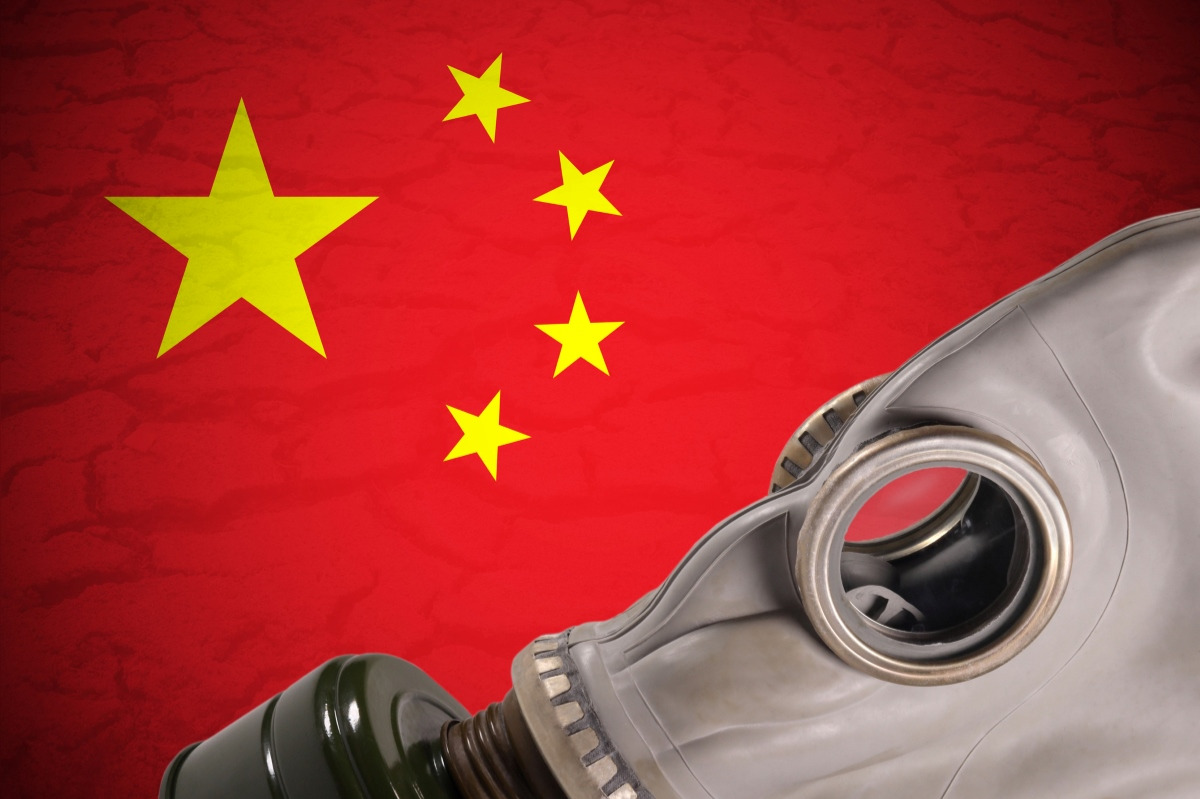
China has been maintaining at least two facilities — one in California and the other in Nevada — that are part of a biological weapons program. (Image source: iStock/Getty Images)
China has been maintaining at least two facilities — one in California and the other in Nevada — that are part of a biological weapons program. A Declaration of Arrest Report, issued by the Las Vegas Metropolitan Police Department in connection with the detention of Ori Solomon on January 31, states that there is a "deeper conspiracy" between an illegal biological lab in Reedley, California and a residence containing apparently dangerous substances in Nevada. On January 31, Las Vegas SWAT and federal agents raided a home on the eastern outskirts of the city and seized over a thousand vials of an unknown substance or substances. Those vials have been sent to an FBI lab in Maryland for analysis. A housecleaner tipped off authorities after she and others temporarily residing at the home got "deathly ill." Solomon was the property manager of the location.
Continue Reading Article
|

















